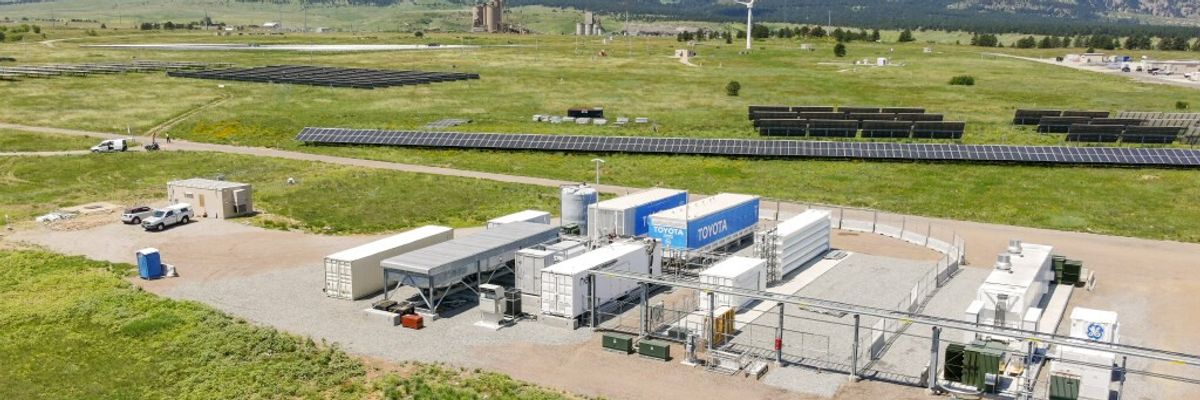As our planet's temperature rises, so does the hype around hydrogen. But hydrogen isn't the climate savior it's made out to be. Hydrogen is a dangerous distraction, and we should not fall for it.
Technological fixes to climate change are tempting, and the Biden administration has not resisted the lure of hydrogen: The Department of Energy recently announced a massive $7 billion buildout of seven hydrogen hubs nationwide, the first of several such investments.
Hydrogen is dangerous, partly because it distracts from the real climate solutions we so desperately need. The world's best climate scientists have been clear that to maintain a livable planet, we must phase out fossil fuels and transition to truly renewable energy now. Hydrogen hubs take us in the opposite direction by further embedding us in the fossil fuel economy.
Communities like mine understand all too well that these projects take a toll on our drinkable water, breathable air, bodies, and livelihoods.
A staggering 99% of hydrogen production relies on fossil fuels, primarily methane, or "natural," gas. Notably, oil, gas, and petrochemical companies produce the lion's share of the U.S. hydrogen supply: approximately 10 million metric tons. Once produced, more than two-thirds of hydrogen is used for petroleum refining.
A cursory examination of the partners across all seven proposed hydrogen hubs reveals who actually stands to benefit from them. Key recipients of this first $7 billion of public money are oil, gas, and chemical corporations, including Exxon, Chevron, Dupont, and Air Products. Air Liquide, a French gas company, is a named partner in at least six of the seven hubs chosen for the next phase of public funding. Fossil fuel and petrochemical companies are pushing for this hydrogen buildout because it is their ticket to greenwash their products as 'climate solutions' on the public's dime.
Making hydrogen is highly energy intensive, whether using large quantities of renewable power to make 'green hydrogen' through electrolysis or pulling in large quantities of methane gas coupled with energy-intensive and unreliable carbon capture systems to produce "blue hydrogen." At least two of the seven hydrogen hubs are associated with blue hydrogen production, which scientists say "may be worse than gas or coal."
Hydrogen production is not only very energy intensive, it also requires considerable amounts of water, a resource that is becoming increasingly more precarious due to the climate crisis. Louisiana this year faced never-before-seen wildfire threats, predicted to continue, largely due to drought. California has had some of the worst wildfire seasons on record. Both states are targeted for the proposed hydrogen buildout.
Calls for "hydrogen-ready" infrastructure are code for doubling down on building new gas production and pipelines, with the vague hope that this infrastructure might one day carry hydrogen. This is the opposite of what we should do, which is to take urgent action to phase out fossil fuels and transition to renewable energy to avoid climate catastrophe.
Hydrogen projects, especially blue hydrogen, put communities in harm's way. To produce blue hydrogen, CO2 must be scrubbed and captured, a process whose effectiveness is questionable at best. This process requires the buildout of additional infrastructure, thousands of miles of new pipelines, and injection wells to store the CO2 underground. This means more hazardous air and water pollution in our communities. People living near this new infrastructure for hydrogen and CO2 stand to face additional risks like pipeline leaks and injection well failures, which can be catastrophic.
Confusingly, funding for these hydrogen hubs is partially allocated under the "Justice40" initiative, which aims to address decades of underinvestment in disadvantaged communities. Yet many communities targeted for the hydrogen buildout—the same low-income and/or Black, Brown, and Indigenous communities supposed to benefit from the administration's environmental justice promises—are organizing against proposed hydrogen projects, because of the dangers they present.
I have had to become an expert on climate solutions out of sheer necessity. I am the fifth generation of my family to call South Louisiana home, and the climate crisis is coming for us in Louisiana faster than anywhere else in the country. At the same time, we're a target for the nationwide buildout of hydrogen, carbon capture, and other technological false solutions to the climate crisis.
Communities like mine understand all too well that these projects take a toll on our drinkable water, breathable air, bodies, and livelihoods. The projects come with often elusive promises of jobs, but those poised to truly benefit from these projects are fossil fuel and chemical companies.
Impacted communities deserve better. They deserve to be at the table when it comes to finding solutions that work for people and the climate. Just as importantly, they deserve justice for the harms wrought upon them by the fossil fuel industry. We all deserve a livable, breathable, drinkable future. And that future is not found in a hydrogen hub.
Beyond the fossil fuel industry's expensive hydrogen distraction, there are community-centered solutions that provide jobs and improve lives without jeopardizing communities. There are safe, scalable, proven, and affordable solutions like solar and wind energy, energy efficiency, local and regenerative agriculture, and zero waste programs that empower communities and make the most of limited and dwindling resources.
We need to stop subsidizing the fossil fuel industry, stop harming communities with false hype for hydrogen, and direct funding to real solutions to the climate crisis.
We have no time to waste.




